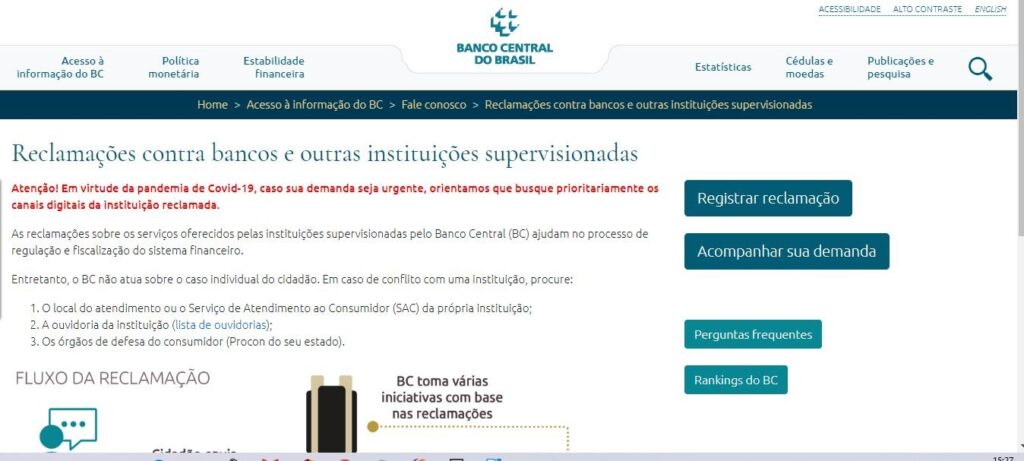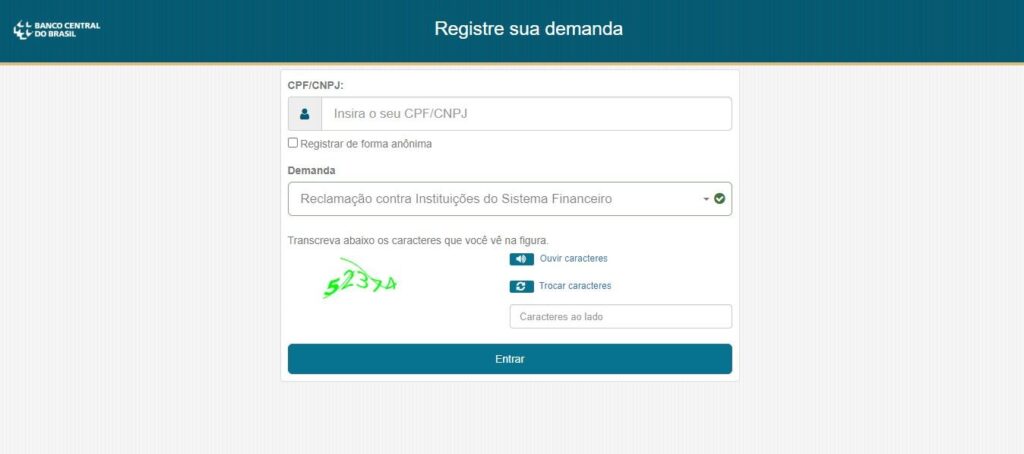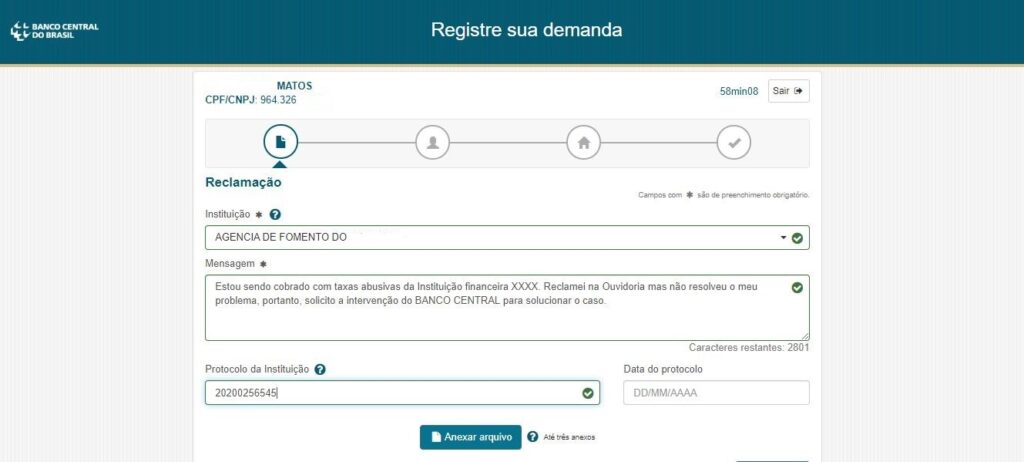Banco Pag! is part of the Avista Group, which has been operating in Brazil for over 20 years. Thus, it positions itself as an option in the market that combines experience and credibility with the practicality of online financial services.
The Pag!, however, is young. It was founded in 2017 and in August of that year it surpassed many competitors in the market at the time by reaching the mark of around 220 thousand visits.
Do you want to know more or have something to resolve with the bank? See below how to get in touch.
Phone Pay!
Many customers tremble at the thought of calling their bank. Perhaps it was with this in mind that Banco Pag! decided to do something different. It does not have telephone numbers that customers can use to contact them. Only an email address and two SMS numbers. Here you can see what they are:
How to get in touch
Email Pag!
To contact Pag!, you can use email. Just send your question, complaint or comment to the following email address: [email protected]
SMS Pay!
If you prefer, you can also contact the bank via SMS. Use your cell phone to send a message to the following numbers: 29040 and 28504.
Whistleblower Channel
Despite the lack of a telephone number, Banco Pag! provides a Reporting Channel. According to them, the channel is a space created exclusively for them to report any act that could put them at risk.
Once your report is submitted, it is forwarded to the responsible personnel in a confidential and completely confidential manner. It is even possible to register anonymously.
To use the Reporting Channel, simply access the website. You can also discuss these matters via the Banco Pag! app's 24-hour chat or by email: [email protected]
Chat Banco Pag!
Another way to contact the bank is through the app's chat. The service is online 24 hours a day, 7 days a week. To do this, access the chat "It helps me" in the app menu.
Social media
In addition to the channels above, Pag! is also on social media. Get your questions answered and stay up to date with all the news by accessing the following networks:
Frequently Asked Questions
If you don't want to have to contact the bank to resolve your issue, you can also consult the frequently asked questions answered by Pag! on the website. Access the it helps me to resolve issues such as:
- I entered the wrong card password, what now?
- I didn't receive the tracking link
- Pay the invoice in installments and confirm the down payment
- Deadline for card delivery and more
Other Channels
Customer service channels should be sufficient to resolve all customer queries. However, this is not always possible. That is why there are other means by which anyone can make complaints about products and services. Check out some options below:
Central Bank
Any citizen can file a complaint about the services of a given financial institution with the Central Bank of Brazil (BCB). However, the BCB does not have the legal authority to act on individual cases. Below we will show you in detail how to file a complaint with the Central Bank.
Consumer Portal
The Consumer Portal is a free public service that allows communication between consumers and companies. It is possible to register complaints on portal and the company has up to 10 days to respond. The procedure, however, is only valid for companies registered on the website voluntarily.
Procons
Procons are bodies linked to state governments that work to defend customers' rights. Any individual or legal entity can file complaints through website or in person. There are no fees charged.
Want to know a little more about Banco Pag? Watch the video below:
Complaint to the Central Bank of Brazil
Many users of banking services do not know, but when they have some kind of problem with a bank and the bank does not resolve it through its ombudsman, a very practical and viable alternative is to make a complaint to the Central Bank.
The Central Bank of Brazil is a highly regarded institution and, among other responsibilities, it is responsible for regulating and supervising the national financial system. The institution also currently works to ensure the stability of the purchasing power of money.
In the specific case of Banks, the Central Bank supervises and controls banking institutions, aiming to prevent abuses and other arbitrary acts that may be committed by the country's financial agents.
So if you had a more serious problem with the PAG Bank or any other financial institution and this problem was not resolved by the ombudsman, you can register your complaint very simply on the Central Bank website.
Once the complaint has been made, the Central Bank will contact the PAG Bank to request information about the complaint made.
In normal situations, the Central Bank takes around 8 to 10 business days to respond to the citizen. However, this period depends largely on how long the bank that was complained about takes to respond.
If your complaint is fair, the Bank will usually reverse its procedure or in some way seek to correct the error made, notifying the Central Bank about this occurrence.
Logically, if your complaint to the Central Bank is unfounded, no action will be taken, as the Central Bank will analyze your case and forward it to the institution, acting in this case as a mediator of the problem.
As previously mentioned, it is very simple to file a complaint with the Central Bank. The entire procedure is carried out online, and it is important that you register an email address to receive notifications each time the process is processed.
Another very important point to remember is the need to have the complaint receipt protocol at the Bank on hand. Have this number on hand as you will need it when making your claims.
It is also important to clarify that the Central Bank will ask you to write a text explaining exactly what happened between you and the bank. At this point, be as detailed as possible, providing the date, time, name of the attendant, what was said, protocol number, etc. Don't leave anything out!
Step by step: making a complaint on the Central Bank website
To initiate the complaint procedure at the Central Bank, you can click here.

As you can see in the image below, you must enter your CPF number and select Complaint against Financial System Institutions.

Solve the Captha and the screen will open for you to fill in the necessary data:
- Choose the name of the Institution
- Select Subject
- Enter your message, stating the complaint you want to make
- Enter the Financial Institution's protocol number

From there, the Central Bank will ask for your email and telephone number, generating the service protocol after that.
With the complaint protocol in hand, as stated above, you just need to wait for the bank's response regarding your complaint.
Questions and Answers about Complaints at the Central Bank
1- Which institutions does the Central Bank supervise?
The Central Bank supervises multiple banks, commercial banks, cooperative banks, investment banks, development banks, exchange banks, savings banks, credit unions, credit, financing and investment companies, real estate credit companies, leasing companies, exchange brokerage companies, securities brokerage companies, securities distribution companies, development agencies, mortgage companies, credit companies for microentrepreneurs and small businesses, payment institutions and consortium administrators.
2- Can I file a complaint against an Institution authorized to operate by the Central Bank?
Yes, complaints may be filed by customers and users of products and services from financial institutions and other institutions authorized to operate by the Central Bank, such as credit unions, payment institutions and consortium administrators, whenever there is evidence of non-compliance with legal and regulatory provisions whose supervision is the responsibility of this Agency.
3- Does a complaint to the Central Bank have the same effects as a lawsuit?
No. The Central Bank acts in the administrative sphere and does not replace legal action. Therefore, if your problem is not resolved by the Central Bank, you can file a lawsuit.
4- Does the Central Bank regulate the waiting time in bank queues?
No. The Central Bank does not regulate waiting times in queues. There are state and municipal laws that address this issue. It is up to consumer protection agencies (Procon, Prodecon, Decon) to provide guidance on this topic.
5- Does the Central Bank set the value of fees charged by banks?
The Central Bank does not determine the amount of fees. However, there are some services that banks must provide free of charge. Subject to the prohibitions, each institution is free to establish the amount of its fees.
Taking Legal Action Against a Bank: Is It Worth It?
Many people wonder whether it is worth taking legal action against a bank. Is it feasible? Is it worth it? To answer this question, first of all, you need to know the extent of your problem with the banking institution.
We know that most of the problems involving customers and banks are issues that are easier to resolve through a complaint to the bank's own ombudsman or even by making a statement to the Central Bank.
However, when the situation is more complicated and involves larger amounts, the customer may consider filing a lawsuit against the financial institution, knowing that this will be a last resort, after exhausting administrative avenues for resolving the conflict.
One option for those who were unable to resolve the issue through conventional means is to file a lawsuit in Small Claims Court in your region, which is the competent body to process cases of up to 40 minimum wages. It is important to emphasize that, for cases of less than 20 minimum wages, it is not mandatory to appoint a lawyer.
Another advantage of JEFS that cannot be forgotten is the absence of legal costs for litigants, that is, you will not need to pay anything to file a lawsuit against the Bank.
To be successful in a case before the Small Claims Court, it is important that you gather as many documents as possible, such as contracts, bank statements, emails, collection letters, proof of payment, etc.
Another fundamental thing in this type of process is to have all the details of the Bank against which you are going to file the lawsuit: address, telephone number, CNPJ, name of the manager, among other important information so that the justice officials can locate the financial agent.
And as previously mentioned, there is no need to hire a lawyer, although if you have the means, this is highly recommended, considering that in more complex cases the assistance of a specialist will be essential for you to be successful in the dispute.
Therefore, now that you know all the details about how to file a lawsuit against a bank, it is up to you to decide whether or not this is viable, whether it is the best solution or not.
Other forms of complaint against a Bank
If you don't know, nowadays there are several ways to complain and show your dissatisfaction with banking services. This means that you are not obliged to accept any type of illegality on the part of any agent of the country's financial system.
Unfortunately, nowadays, all sorts of irregularities occur in banking transactions. People are paying excessive interest or fees, others have their credit ratings listed without owing a single cent. In short, there are all sorts of complaints.
If, like many Brazilians, you have complaints about banking services or customer service, you should know that society has increasingly created mechanisms to give voice to dissatisfied people. Here we will give you just a few examples of how you can complain about abusive practices by banks.
You can choose between some of the complaint methods or you can even use all of them until your problem is finally resolved. Remember that first of all it is important to try to resolve the problem with the bank you have complaints about and only after that you can take other actions to protect your rights.
Complain here website
The Reclame Aqui website is a private platform, but it has helped many people solve their problems with financial institutions such as Pag Bank for example, that has a good reputation on the platform.
Reclame Aqui works as follows: the person who wants to make a complaint registers on the website, makes their statement in writing, being able to present any documents they deem necessary and completes the request by generating a protocol.
After this, the Reclame Aqui website itself contacts the company complained about, which normally informs its version of the facts and often solves the customer's problem.
Most companies respond very well to complaints made on this platform, while others don't respond at all. But in general, it's worth trying to make a complaint on the website. Access here to learn about the service.
Procon
A well-known body among Brazilians is Procon, always remembered for its fight to defend consumers. Procon is linked to the States and serves the entire population when it comes to consumer protection codes.
If you have easy access to this body, a complaint to Procon may be a viable alternative. It is known that financial institutions as a whole, especially banks, often have serious problems with their customers, and Procon may be the defender of the weaker side at this time.
Another advantage of seeking out Procon to file a complaint is the fact that it is a public service, that is, completely free, in which the consumer can have a strong arm in their defense against the abuse of power by large corporations.
Important Notice
The Achei Celular website is an independent project that has no connection with Banco Pag or government consumer protection entities. The purpose of this article was only to inform about the phone number of the Bank Pag and other forms of contact with the institution, for informational purposes only. If you have any complaints to make, look for the companies' official channels and under no circumstances leave any personal data in the comments field.




Atualmente, o Stake Casino se consolidou como uma das principais opcoes para jogadores brasileiros. Para entrar no site com seguranca, basta usar o acesso oficial disponivel aqui — [url=https://beststakeoffers.net/br/]Aposte ao vivo em esportes com odds competitivas no Stake Casino Brasil[/url]
. Com uma vasta selecao de jogos, interface amigavel e assistencia dedicada, o Stake conquista muitos jogadores.
“Divirta-se com diversos games sem complicacoes!”
Registro no Stake Brasil | Crie sua Conta em Poucos Minutos
O cadastro no Stake e descomplicado. Usuarios do Brasil podem iniciar a diversao em instantes. Basta visitar o portal usando o acesso confiavel, apertar “Inscrever-se”, inserir as informacoes e confirmar o e-mail. Depois disso, adicione fundos e comece a jogar.
“Crie sua conta rapidamente e ative sua oferta!”
Bonus no Stake BR | Promocoes Generosas
Os premios iniciais sao um dos motivos para jogar. Novos usuarios podem aumentar o saldo antes de iniciar as partidas. Entre as vantagens estao bonus de primeiro deposito, giros extras e o programa de fidelidade.
“Dobramos seu primeiro deposito para aumentar suas chances!”